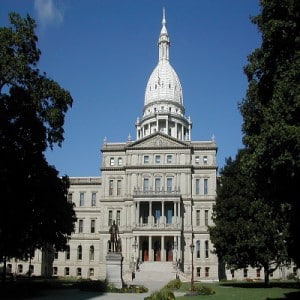 In a meeting of the House Judiciary Committee on April 30, the 3-year old proposal called The Provisioning Centers Act and two-year old Smoking Alternatives bills were finally resurrected for debate and consideration.
In a meeting of the House Judiciary Committee on April 30, the 3-year old proposal called The Provisioning Centers Act and two-year old Smoking Alternatives bills were finally resurrected for debate and consideration.
Or were they?
The two bills listed on the Committee agenda are designed to correct defects in the Michigan Medical Marihuana Act (MMMA)- some caused by courts and some by the language of the MMMA itself.
One would create a system of medical marijuana dispensaries, called Provisioning Centers, which would be locally approved and state certified. The other bill would restore the legally protected status of marijuana derivatives, including foods and concentrated types of cannabis medications, allowing registered patients to be protected by law for using and creating those medicines as they were until 2013.
Instead of addressing these bills directly, the Committee spent much of their time listening to talk on issues such as the power of the “marijuana lobby,” the harm marijuana may cause to children and the possible negative effects of legalizing cannabis for adult use in Michigan.
Testifying, or not, were the two bill sponsors- Rep. Michael Callton (R-Nashville) and Rep. Lisa Posthumus Lyons (R-Alto)- along with parents, their sick children and Sgt. David Kelly, section commander with the Michigan State Police (MSP), Special Investigations Division with the Narcotics Section.
The Representatives explained the need for their bills to be passed. Robin Schneider, Legislative Liaison for the National Patients Rights Association (NPRA), fielded questions and directed conversation. The parents gave speeches of significance, each side-by-side with their child, their stories clearly reaching the hearts of most Committee members.
Sgt. Kelly… well, he narrated a slide show.
Provisioning Centers Act or Legalization Centers Act?
Despite the subject- fixing the medical marijuana laws in Michigan- Sgt. Kelly delivered an off-topic presentation the Committee agenda titled, “Colorado: Lessons Learned- Medical Marijuana Expansion to Recreational Marijuana.”
Before beginning his prepared comments Sgt. Kelly made a statement to the Committee that seemed to distance himself from the contents of the slide show. “I just want to make it clear that I’m not testifying, I’m just giving a presentation,” Kelly told the Representatives.
The MSP presentation included slides with titles like “Medical Marijuana’s Transition to a Legalized Structure” and featuring a series of panels covered with pictures of products created for the legalized marijuana market in other states. The presentation failed to reference a single line of language contained within either of the two bills under consideration by the Committee.
Several slides drew chuckles from the crowd and made Representatives shake their heads in disbelief. One slide, titled “The Attractiveness of Provisioning Centers in Michigan,” didn’t include any information regarding provisioning centers at all- instead, the graphic showed fuzzy math proclaiming that a single caregiver in Michigan today can produce an absurd 38,707 marijuana joints per year per patient- more than 100 joints per day!
This math was predicated upon a yield of 1 pound of dried, usable marijuana per harvested plant, a weight Kelly described as a “conservative” average. Despite the crowd’s shocked reaction to that number, Committee Chairman Rep. Kesto (R-Commerce Twp) went even further, telling the Committee that he’d visited distribution centers and experts there told him their yields vary from “One to four pounds per plant.”
These questions challenging the current limits and abilities guaranteed by the medical marijuana program led some in the crowd to speculate on Kesto’s willingness to reduce a caregiver’s current ability to produce medicine for their patient, or to take their excess marijuana to Provisioning Centers.
HB 4209 and HB 4210 would allow licensed, registered caregivers to bring their excess marijuana to Provisioning Centers, and maintains the current limit of 12 plants and 2.5 ounces allowed per patient.
The Committee Chairman asked the sergeant about the production of concentrates and the two bills.
“Do you believe that, If we move in that direction, that it would need to be extracted in a commercial location?” Kesto asked.
“Yes, I think it would be safer than extracting it in the home.”
“Do you believe (those extraction sites) should be prohibited from being in a residential area?”
“Yes,” Sgt. Kelly eventually answered.
Rep. Kesto questioned Schneider about caregiver training and raised the issue of a legalized marijuana market during session on the 28th. In an odd move, Kesto peppered NPRA’s Schneider about the medical-based organization’s position on legalized marijuana. Schneider’s response, in a nutshell: until you fix the MMMA, there’s no reason to talk about legalization in the House of Representatives.
Back to the drawing board
The House Judiciary Committee already passed these two bills, unanimously, in 2013. Rep. Kesto was on that Committee and voted to approve both bills, which are relatively unchanged. This revisit to a previously-decided topic may have gone back two years, but the MSP slide show raised issues of marijuana’s medical efficacy that were clearly decided years ago.
The presentation by Sgt. Kelly contained arguments against allowing marijuana- legal or medical- into the hands of Michigan citizens, an argument that was settled definitively in 2008 by the voters. Much of his presentation was centered around tying the availability of marijuana for medicinal purposes to the consequence for children.
Slides in the MSP program showed bottles of colorful marijuana-infused liquid that Kelly claimed unfairly targets children as the end consumer. The bottles looked remarkably similar to the flavored tequilas and margarita mixers found on liquor store shelves in nearly every neighborhood in the state.
He disclosed that the presentation “stems from a January 2015 meeting held in Colorado by their Association of the Chiefs of Police,” Sgt. Kelly told the Committee. Those included many facts and figures “as reported by the state of Colorado approximately one year after entering the legalized recreational market.”
“Lesson #1 that we can take away from Colorado is not to underestimate the marijuana lobby,” Kelly warned the Committee.
Sgt. Kelly identified the Marijuana Policy Project, the Drug Policy Alliance and the National Organization for the Reform of Marijuana Laws as the big three lobbying groups. He offered that the anti-legalization campaign in Colorado spent only $450,000 fighting the initiative, adding the pro-legals spent $20 million.
The Sergeant expanded to say that MPP is a money-for-legislation “machine” who demands a “return on your investment” in the states where they sponsor legislation. That return, Kelly said, came as a twofold benefit: an “infrastructure to dispense the product, and a better product.”
Kelly paused, then stated: “The only way to make a better marijuana product is to increase the psychoactive THC levels to make it a more potent drug.”
Sitting directly behind him were Jim Powers and other parents whose children depend on medicine created from low-dose THC, high-dose CBD marijuana. The difference between the sergeant’s statement and the actual reality could not have been more stark.
A later slide asked: what would Michigan look like with Provisioning Centers? Sgt. Kelly showed slides that indicated Colorado has more legalized and recreational dispensaries combined (827) than they do McDonald’s and Starbucks franchises (632).
The second lesson, Sgt. Kelly said, was that legislators should know “today’s marijuana is not the marijuana that they remember.” Slide after slide flashed by to illustrate the increase in average THC levels over time.
Later, Kelly introduced slides and spent a significant amount of time discussing marijuana use and the development of the adolescent brain. Adolescent use of marijuana is a criminal offense and is not authorized by either of the two bills up for consideration, except as recommended under law for medicinal purposes.
During a broadcast of the Planet Green Trees Radio Show (PGT) on the 30th, attorney Michael Komorn renewed his pledge to defend any parent who faces criminal charges for the administration of concentrated cannabis to their registered pediatric patient child.
PGT co-host Rick Thompson explained that Komorn Law would “help protect pediatric patients and their parents should they find themselves run afoul of the law for possession of concentrates.”
Komorn agreed and added, under certain conditions, “Komorn Law will represent you, pro bono.”
“I just want to say, thank you,” Jim Powers interrupted. “I know of at least two cases of parents who have actually continued the cannabis therapy as a direct result of your offer… Just the mere offer has made a difference in people’s lives.”
Powers is the founder of Michigan Parents for Compassion and appeared as a guest on the PGT Show. He provided testimony to the Judiciary Committee earlier that day. ”These two bills are a huge step forward in bringing clarity to the Act and helping to expand patient protections,” he told PGT.
Testimony on the two bills will resume Thursday May 7 in the Judiciary Committee.
View HB 4210 HERE.
View HB 4209 HERE.
The formal notice is below.
Standing Committee Meeting
Judiciary, Rep. Klint Kesto, Chair
DATE: Thursday, May 7, 2015
TIME: 9:00 AM
PLACE: Room 307, House Office Building, Lansing, MI
AGENDA:
TESTIMONY ONLY:HB 4209 (Rep. Callton) Health; medical marihuana; state and local regulation of marihuana provisioning centers; provide for.
HB 4210 (Rep. Lyons) Health; medical marihuana; marihuana-infused products; allow and regulate.
OR ANY BUSINESS PROPERLY BEFORE THIS COMMITTEE
To view text of legislation go to:
www.legislature.mi.gov/mileg.aspx?page= CommitteeBillRecord Committee Clerk: Melissa Weipert
Phone: 517-373-5176
e-Mail: [email protected]







